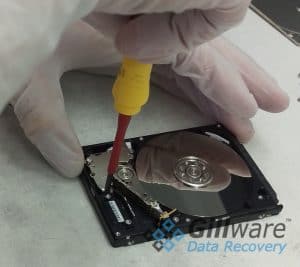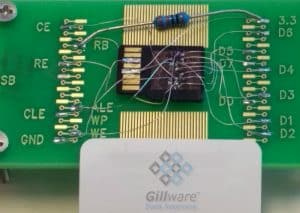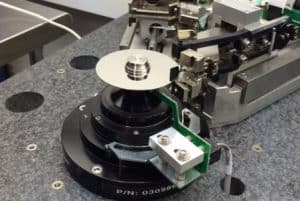Data Retrieval Services
Looking for a data retrieval service? When you’re faced with a broken computer, flash drive, memory card, or phone, sometimes recovering their data is just outside your own capabilities. In these dire situations, you will need to enlist the help of a professional data retrieval service.
We store more of our lives on electronic devices than ever before, from our computers and external hard drives to our mobile phones. Murphy’s Law is in full effect with data storage devices. When things go wrong, people can lose years of precious family photos, vital business and tax documents, and all sorts of other valuable data.
These devices can break down, or accidents can happen. Sometimes you have to deal with a dropped laptop or external HDD, or a computer that just won’t boot up. You may also encounter bent and broken USB flash drives and USB device not recognized or device not detected errors. These are situations where a professional data retrieval service will come to the rescue.

What to Look For in a Data Retrieval Service
When you’re shopping around for a data retrieval service, there are a few things you should keep in mind. In your search for a data recovery service provider, you’re looking for a quality data recovery company. This needs to be a company you’ll feel comfortable sending your failed storage device to. The data retrieval service needs to be able to deal with all of the devices people store their data on, from hard disk drives to mobile phones.
You want a data recovery company with the equipment and expertise to handle any challenge. You want a data recovery company with secure facilities, where you know the personal data on anything you send in is kept safe. And you want a data recovery company that can provide professional and world-class data retrieval services at a price that won’t break the bank.
Hard Disk Data Retrieval Experts
In any computer repair shop, you’re bound to encounter plenty of hard drives that have broken down. This can be because a customer accidentally dropped their laptop or external hard drive, or spilled water on their computer, or all sorts of other flubs. But often, hard drives break down just because their parts have worn out from age and use. These hard drives may make beeping, clicking, or grinding noises when they fail. When HDDs break down, retrieving the data from them is a task best left to hard disk data recovery specialists.
The data recovery experts at Gillware have spent years honing their skills. The people in our lab have tens of thousands of hours of combined experience and thousands of successful hard disk data recovery cases under their collective belts. On a daily basis we see hard drives from every manufacturer. Experts like the ones here at Gillware know how to deal with just about every make and model of hard disk drive, from the most archaic models to the latest and greatest (although to the owners, they may not seem so great once they’ve broken down).
Wherever a hard disk drive’s problems lie, you can trust professional hard disk data recovery experts to do the best job possible to safely and efficiently fix these problems and retrieve the data that lies within.
Hard drive data retrieval experts are also well-versed in fixing hard drive firmware issues. Hard drive firmware, the invisible “operating system” that governs a drive’s behavior, can develop glitches and bugs as a result of the hard drive’s failure. Often it’s impossible to retrieve data from a hard drive without fixing these firmware issues. The tools and experience needed to do so exist in professional labs staffed with hard disk data recovery experts.

Solid State Drive, Flash Memory, and Mobile Phone Data Retrieval Specialists
A professional data retrieval service doesn’t just focus on HDDs. More and more people store data on SSDs, USB flash drives, SD and microSD cards, and on their mobile phones. Just like hard disk drives, these storage devices are not immune to failure themselves. However, the way they store data is very different. When these devices break down, only data recovery professionals will have the tools and expertise needed to successfully recover the data from them.
As the per-gigabyte costs of flash memory fall, more and more computers are coming with a solid state drive inside of them in lieu of a typical hard drive. SSDs, like USB thumb drives and mobile phones, use flash memory chips instead of spinning disks to store data. When SSDs fail, recovering data from them can be incredibly difficult due to the design choices made by their manufacturers. The same is largely true of mobile phones as well.
To recover data from solid state devices (SSD), professional data retrieval companies have to invest heavily in research and development to determine how these devices store data and how to access the data within when these devices break down. Highly skilled and creative computer scientists must figure out novel approaches to data recovery with every development in flash memory data storage.
At Gillware Data Recovery, our partnerships with SSD manufacturers have helped us pioneer new techniques for successful SSD data recovery. Thanks to our innovative flash memory data recovery specialists, we’ve developed groundbreaking methods for recovering data for the monolithic chips often found in broken USB flash drives and SD cards.

Data Retrieval Clean Room Lab
Any professional data retrieval service must have appropriate clean room facilities. Hard disk drives have extremely sensitive internal components. Any attempt to repair a broken hard drive outside of a contaminant-free environment almost always simply makes the problem even worse, potentially causing damage to delicate components.
Gillware’s cleanroom workbenches are ISO-5 Class 100 certified, providing an optimal clean environment for hard drive repair. In our professional data recovery lab, our engineers can replace failed read/write heads and spindle motors, repair damaged PCBs, and burnish scratched platters safely in order to recover data from failed hard disk drives.
Data Retrieval Facility Security
One of the most important aspects you want in a professional data retrieval service is data security. Any data recovery company you send a failed hard drive or other storage device to should be able to keep your customers’ data safely under lock and key.
A professional data recovery lab has secure facilities to protect its customers’ data. At Gillware, all of our facilities are internally audited. We train all of our staff to follow proper IT security protocols. Our data recovery facilities are GSA-contracted and HIPAA-compliant; we meet the security standards necessary for government and healthcare agencies to use our services. Gillware’s data recovery facilities meet SOC 2 Type II standards for IT security.
The security measures we have in place protect all of our clients. Data from a customer’s storage device only ever leaves our facility on its way back to the customer. We securely encrypt recovered data to prevent any chance of interception by a third party. With our secure data recovery facilities, our clients can sleep easy at night knowing their data is in good hands.
Data Retrieval Services: an Affordable, Financially Risk-Free Process
Data retrieval experts work in a highly specialized field. Many factors affect the cost of data retrieval services; balancing affordability with quality is a difficult tight-rope walk. At Gillware, we work hard to provide affordable data retrieval services.
Our data retrieval company offers affordable data retrieval services at average rates of 40-50% what other equally-professional labs charge. Our entire data retrieval process is financially risk-free. We offer free inbound shipping for US customers, free data retrieval evaluations, and no upfront charges for data retrieval services. What’s more, Gillware operates under a “no data, no charge” policy. There are no cancellation fees if a customer decides to back out after evaluation. We also do not charge any fees if our efforts ultimately are not successful.
